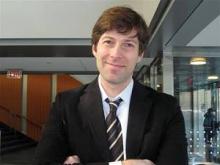Dr. Gene Bukhman first became committed to working on noncommunicable diseases in underserved regions after traveling to the former Soviet Union in 1998 to help support the treatment of patients with multidrug-resistant tuberculosis who are often on the fringes of the health care system.
"Dealing with TB in Kazakhstan attracted me to similar problems," he said. "Many noncommunicable diseases share a quality: The patients who have them push the boundaries of the dialogue on health and human rights." It's an area "that's been neglected," he said.
Having recently completed a cardiology fellowship at the Beth Israel Deaconess Medical Center, Boston, Dr. Bukhman found the experience in Kazakhstan transformative, pushing his clinical and geographical boundaries.
That new direction led him to Rwanda, where he has been working since 2006 and currently serves as senior technical advisor on noncommunicable diseases to the ministry of health in conjunction with the global nonprofit organization Partners in Health. In 2010, he was named director of the Program in Global Non-Communicable Disease and Social Change at Harvard Medical School, Boston.
What drew you to Rwanda in particular?
Rwanda was attractive because it had a government that was known to be ambitious about health and human rights. It was hungry to take on a range of health problems, and that’s part of why it recruited Partners in Health.
I really wanted to work with that government in particular. I started out working as a doctor at the district level, along with Rwandan colleagues. I was a cardiologist at that point, so I was seeing things through that lens. But then I started thinking about how to fill gaps in services and that evolved toward working with the hospital directors and the leadership at the district level.
There was a meeting in January 2010 at which the national partners got together and recognized that the ministry needed a department to focus on noncommunicable diseases. At that point, I was recruited to be the senior technical adviser for that unit. I work with a partner, Dr. Eugene Ruberanziza, in the Rwandan government.
What are some of your key achievements to date?
There is a system in place now in which there are two nurses in each of three districts who provide a high level of care. They are capable of performing echocardiography and evaluating different types of heart failure.
In addition, nurses at the health center level are providing integrated services for chronic diseases, including HIV, and hundreds of community health workers are supporting the patients on a daily basis.
At this point, about 3,000 patients with noncommunicable diseases in Rwanda are being cared for at the district health center level, including patients with malignancies, diabetes, and heart, rheumatic and chronic respiratory diseases. In Rwanda, these conditions are often linked to infections or malnutrition, rather than to tobacco use or being overweight.
This year, we are creating a strategic plan and finalizing guidelines that will allow these districts to be used as training grounds. The benefit of having this kind of setup is that nurses from other districts can come to the model districts to train. There will be experienced practitioners, the opportunity to use electronic medical records and a formulary with the right kind of equipment. We hope to have another two districts in place next year.
The idea is that within a few years, all of the approximately 30 districts in Rwanda will have similar kinds of health care services available. That’s one piece of what is needed to take on noncommunicable diseases. There are certainly other initiatives.
What are some of your other initiatives?
We're aiming to increase the level of training for physicians. There is a great need for attending physicians to supervise and train the next generation of Rwandan leaders in health care. Another goal is to decentralize gynecologic services that are not communicable, such as cervical cancer screening and evaluation of benign and malignant breast lesions.
In addition, referral center platforms are needed to strengthen pathology capacities. We have a number of partners working on that. We also would like to develop efficient cardiac centers for rheumatic and congenital heart disease, and a cardiac surgical center.
Can the Rwandan system work in other countries?
Essentially, we think that our system is feasible for many countries. What often helps is that many countries have good chronic care services for conditions such as HIV. So it may be a matter of decentralizing and integrating other services for noncommunicable diseases with HIV programs.

